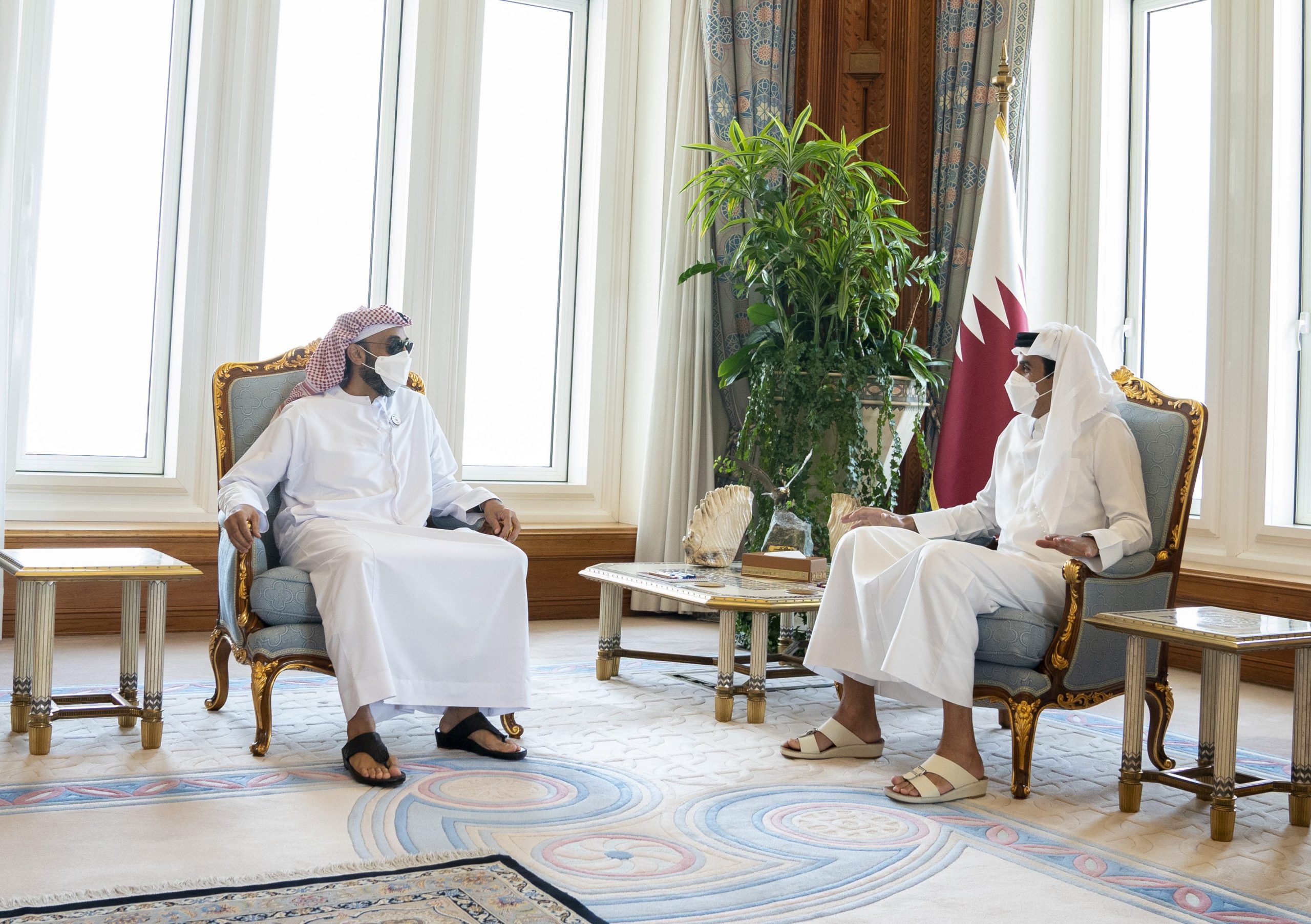Doha and Abu Dhabi’s ties have yet to return to normal, with the latter continuing to provoke Qatar through its media.
The UAE’s National Security Adviser Sheikh Tahnoun bin Zayed Al Nahyan, also brother of Abu Dhabi’s crown prince, met with Qatar’s Amir Sheikh Tamim bin Hamad Al Thani in Doha on Thursday, in the first such visit since the GCC crisis.
According to the UAE’s news agency [WAM], Sheikh Tamim and the Emirati diplomat, along with his delegation, held talks in Qatar over the development of the two countries’ cooperation especially in the economic and trade fields.
Sheikh Tahnoun and the Qatari leader also discussed achieving the common interest of Qatar and the UAE though vital investment projects.
The Emirati official’s visit is the first of its kinds since the UAE, Saudi Arabia, Bahrain and Egypt collectively severed ties with Qatar in 2017, imposing an illegal air, land and sea blockade over terrorism claims. Qatar has consistently rejected those allegations.
سمو الأمير المفدى يستقبل في مكتبه بالديوان الأميري صباح اليوم، سمو الشيخ طحنون بن زايد آل نهيان مستشار الأمن الوطني بدولة الإمارات العربية المتحدة الشقيقة، والوفد المرافق وذلك بمناسبة زيارتهم للبلاد. https://t.co/rPvprr3V34 pic.twitter.com/AEWT5Ynach
— الديوان الأميري (@AmiriDiwan) August 26, 2021
On 5 January this year, Qatar and the rest of the GCC, along with Egypt, signed the Al-Ula Accord in Saudi Arabia, marking the end of the Gulf crisis that fragmented the region.
However, relations have yet to fully warm and the UAE and Bahrain have been accused of attempts to provoke Qatar through their media, with officials from both countries regularly taking aim at Doha.
Commenting on the UAE official’s visit, Dr. Andreas Krieg, assistant professor at the School of Security Studies at King’s College London and researcher of Middle East and North African Studies, said that Sheikh Tahnoun is the equivalent of Sheikh Mohammed bin Zayed Al Nahyan given that the former is the mastermind of political strategy.
“It’s a bit of a realisation from Abu Dhabi that Doha played their card more effectively in order to achieve their objectives,” Dr. Krieg said.
The visit comes at an unexpected time amid a series of tensions between the two Gulf states.
Most recently, the UAE released a film titled “The Misfits” that was shot and financed by Emirati owned film production company FilmGate Production, in which Qatar is referred to as “Jazeeristan”.
The fictional country was depicted as a nation whose citizens support terrorist organisations and leadership finance global terrorism – an accusation used by the former blockading quartet in 2017 to impose sanctions on Doha.
Additional financial backing was provided by a company owned by Sheikh Tahnoun himself, who is also the son of the founder of the Emirates Sheikh Zayed bin Sultan Al Nahyan. The company, Al Muqatra General Trading llc., transferred some $980,125 to fund the film in 2019.
The release of the film raised questions regarding the status of ties between Qatar and the UAE’s post Al-Ula.
“The ideological conflict in terms of where these two sides are standing vis-à-vis, political Islam and the Arab Spring revolution, the support for non-state actors but the support for regimes, I mean these differences remain in the same,” said Dr. Krieg.
The Misfits film producer Rami Jaber receives death threats following Al Jazeera expose
Days after the embargo, the blockading quartet issued a list of 13 demands for Qatar – among which was an order to sever its ties with Turkey and Iran.
Since the rapprochement, the same countries have appeared to show willingness to reconcile with Turkey and Iran, with Qatar proposing to act as a mediator between the rival states.
A week before meeting Sheikh Tamim, Sheikh Tahnoun was in Turkey following months of rare talks with Turkish President Recep Tayyip Erdoğan over mutual investments.
“I think it’s kind of also an admission of peace post the Gulf crisis and the UAE have to realise that despite all their efforts, all the investments that they’ve made against Qatar in the region and also in Washington, they are not able to do a way with Doha’s quite dominant position in this part of the world,” said Dr. Krieg.
Shortly after the signing of the declaration, the UAE reopened its airspace for Qatar’s airlines and reportedly resumed trade activities. Meetings between officials have also been reported with positive feedback.
Saudi Arabia and Egypt restored their diplomatic ties with Qatar with all countries appointing mutual ambassadors for the first time since the GCC crisis. However, the UAE and Bahrain have yet to follow suit.
Political analyst and researcher Dr. Ali Bakeer said the move suggests the Emiratis had no other choice.
“Now that the Qatari-Saudi and the Qatari -Egyptian relations are advancing in the right way, Abu Dhabi has no choice but to mends the fences in order to stay in the game. The question is how much genuine are these efforts and whether they are strategic or tactical,” he told Doha News.
Follow Doha News on Twitter, Instagram, Facebook and Youtube







